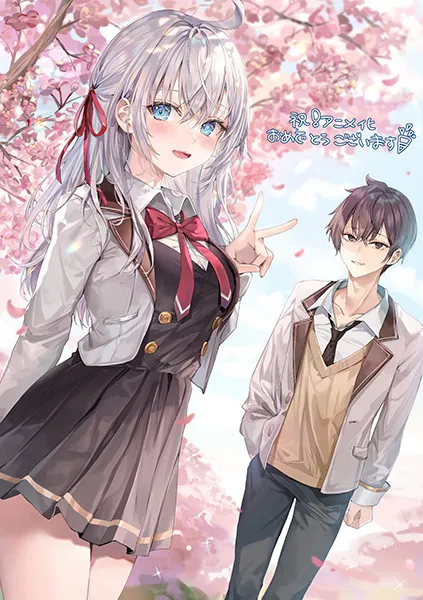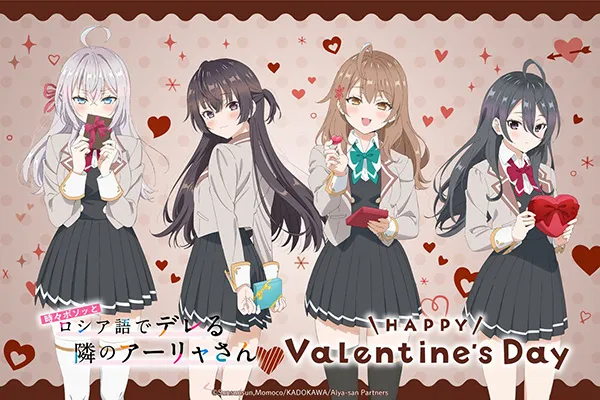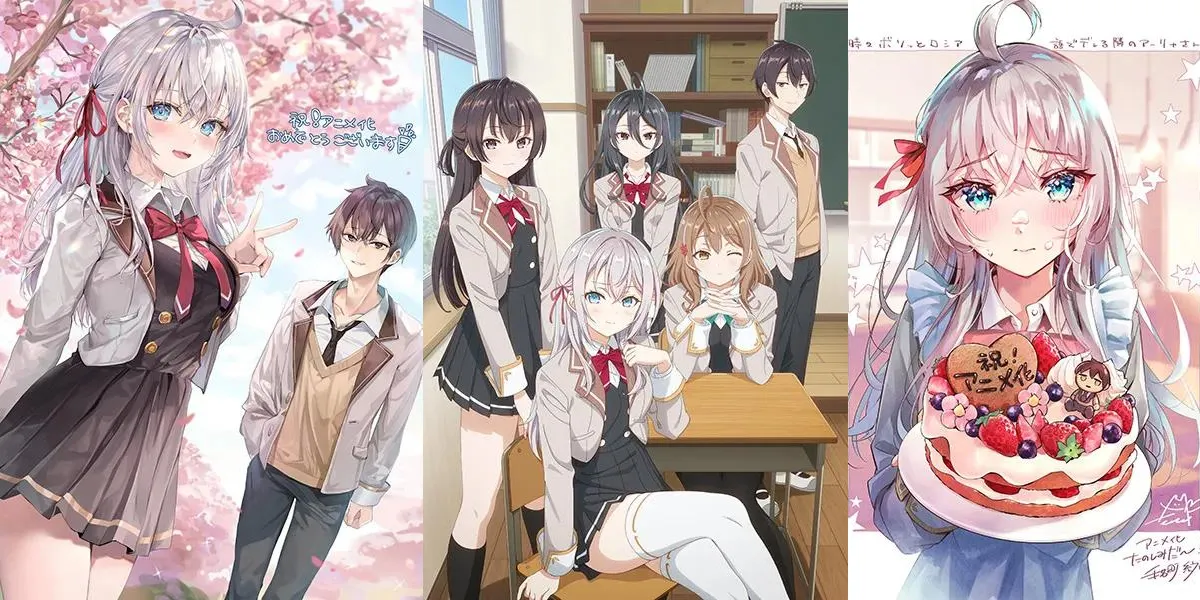The Anime “Tokidoki Bosotto Russia-go de Dereru Tonari no Alya-san” also known as “Alya Sometimes Hides Her Feelings in Russian” is a new summer 2024 anime that started airing on July 3, 2024. It is of Genres: Comedy, Romance, and school. This is the 1st season with a total of 12 episodes. So, Get ready to buckle up, and join us on this anime’s incredible journey!
Storyline

The Enigmatic Charm of Alisa Mikhailovna Kujou: A Tale of Unspoken Affection
Smart, refined, and strikingly gorgeous, Alisa Mikhailovna Kujou, with her half-Russian, half-Japanese heritage, captivates her entire school. Her long silver hair, mesmerizing blue eyes, and exceptionally fair skin have won the admiration of countless male students and the respect of her peers. However, her seemingly unapproachable demeanor keeps everyone at a distance.
The Idol of the School
Alisa’s beauty and intelligence make her the idol of her school. Her presence is both enchanting and intimidating, creating an aura of mystery. Despite her allure, her near-perfect persona makes others wary of approaching her. This combination of charm and distance only adds to her enigmatic appeal.
The Unlikely Benchmate
Among the students, Masachika Kuze stands out as a unique exception. This relatively average boy, who spends his days watching anime and playing gacha games, somehow manages to capture Alisa’s attention. His laid-back attitude contrasts sharply with Alisa’s refined elegance, yet he is the only student she seems to notice.
The Hidden Affection
Alisa’s interactions with Masachika are often marked by a sharp, seemingly harsh demeanor. Unable to express her true feelings, she communicates her affection in Russian, a language she assumes Masachika doesn’t understand. However, Masachika secretly comprehends Russian and enjoys the playful ruse of pretending otherwise.

The Evolving Relationship
As Alisa and Masachika continue their unique dynamic of witty and playful exchanges, their relationship begins to evolve. The gradual shift from mere acquaintances to something more romantic becomes evident. Alisa slowly learns to convey her true feelings, and their bond grows stronger.
The Unseen Depths of Alisa
Alisa’s character is more than just her beauty and intelligence. Her struggle to express genuine affection reveals a vulnerability that contrasts with her composed exterior. This hidden depth makes her a multifaceted character, endearing her even more to those who take the time to understand her.
The Contrast with Masachika
Masachika’s character provides a perfect counterbalance to Alisa. His nonchalant and carefree nature highlights Alisa’s internal conflicts, creating a dynamic that is both engaging and heartwarming. His understanding of Russian, kept secret from Alisa, adds a layer of humor and intimacy to their interactions.
The Language of Love
The use of Russian as a medium for Alisa’s unspoken affection introduces an interesting linguistic element to their relationship. It symbolizes the barriers they face in openly communicating their feelings. As Alisa learns to be more honest, the language barrier becomes a metaphor for overcoming personal insecurities and misunderstandings.

The Growing Affection
Their exchanges, filled with humor and subtle affection, gradually pave the way for a deeper connection. Alisa’s journey towards expressing her true feelings mirrors the universal struggle of overcoming personal barriers to connect with others genuinely.
The School’s Reaction
The school community, while initially wary of Alisa’s aloofness, begins to see the changes in her as she grows closer to Masachika. This transformation not only affects their relationship but also how others perceive and interact with Alisa.
A Heartwarming Tale of Unspoken Affection
The story of Alisa Mikhailovna Kujou and Masachika Kuze is a captivating exploration of hidden depths and unspoken affection. Their evolving relationship, marked by playful banter and gradual emotional honesty, offers a heartwarming narrative of personal growth and connection. Alisa’s journey from a seemingly perfect, unapproachable idol to a more open and affectionate individual provides a compelling and relatable story for all.
Comprehensive Review of “Alya Sometimes Hides Her Feelings in Russian”
Introduction

“Alya Sometimes Hides Her Feelings in Russian” is an anime series that has generated a wide range of reviews. This article aims to provide a summarized review based on various opinions, offering insights into what makes this series appealing and where it may fall short.
Plot Overview
The series revolves around Alya, a half-Russian, half-Japanese high school girl who expresses her true feelings in Russian, unbeknownst to her classmates. The protagonist, Masachika, is an average boy who secretly understands Russian, creating humorous and heartfelt moments as Alya unknowingly reveals her emotions to him.
Main Characters
- Alya: The tsundere heroine with a unique twist, speaking Russian to express her true feelings.
- Masachika: The male lead who pretends not to understand Russian, adding to the comedic and romantic tension.

Visual and Artistic Elements
The animation is noted for its vibrant colors and expressive character designs. The art style is typical of contemporary slice-of-life and comedy series, effectively capturing the humor and charm of the characters.
Voice Acting and Soundtrack
Voice acting is a highlight, with Seiyuus delivering their lines with emotion and authenticity. However, some reviewers noted the imperfect Russian accent, which may detract from the immersion for those familiar with the language.

Themes and Tone
The series explores themes of cultural differences and adaptation, using humor to address the challenges faced by someone navigating a new culture. The tone is light-hearted and comedic, focusing on everyday scenarios and misunderstandings.
Audience Reception
The anime has received mixed reviews, with ratings ranging from 3 to 10. Some viewers appreciate the humor, character dynamics, and unique cultural twist, while others criticize it for being cliché and not living up to its potential.
Conclusion

“Alya Sometimes Hides Her Feelings in Russian” is a mixed bag, offering unique comedic elements and charming character interactions but also falling into common rom-com tropes. Whether you find it delightful or underwhelming may depend on your expectations and tolerance for cliché storytelling.
FAQs:
What makes “Alya Sometimes Hides Her Feelings in Russian” unique?
The use of Russian language as a comedic and romantic device sets this anime apart from other high school romcoms.
Is this anime recommended for fans of the romcom genre?
Opinions vary. Fans of light-hearted, slow-developing romances may enjoy it, while those looking for groundbreaking storytelling might be disappointed.
How is the animation quality?
The animation is generally well-received, with bright colors and expressive designs. Some later episodes have been noted for a decline in animation quality.
Are there any significant drawbacks to the series?
Critics point out the cliché elements and the lack of originality in the plot. The imperfect Russian accents also detract from the experience for some viewers.
Who is Alisa Mikhailovna Kujou?
Alisa is a half-Russian, half-Japanese student admired for her beauty and intelligence, but perceived as unapproachable by her peers.
What is unique about Alisa and Masachika’s relationship?
Despite his average demeanor, Masachika captures Alisa’s attention, and they share a unique bond marked by playful exchanges and hidden affection.
Why does Alisa speak in Russian to Masachika?
Alisa uses Russian to express her affection, assuming Masachika doesn’t understand it. Unbeknownst to her, he does understand and enjoys the playful ruse.
How does their relationship evolve?
Their relationship gradually shifts from witty banter to deeper emotional connections as Alisa learns to express her true feelings.
What is the significance of the language barrier in their relationship?
The use of Russian symbolizes the barriers in openly communicating feelings. Overcoming this language barrier mirrors their journey towards genuine emotional honesty

